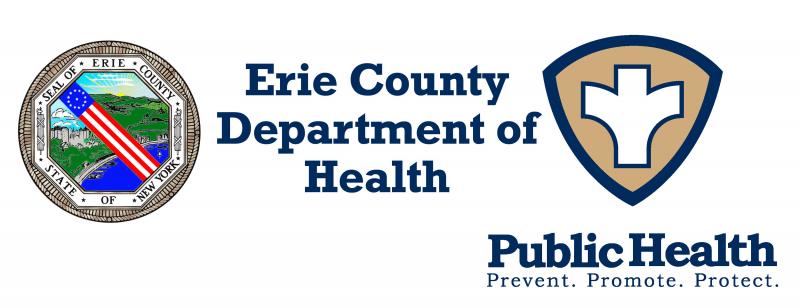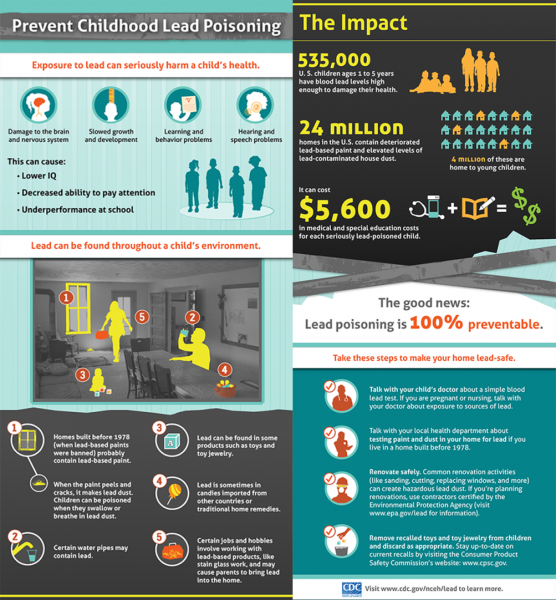Modified: October 26, 2016 4:57pm
Latest News

PRESS RELEASE
From the Office of the Commissioner of Health, Dr. Gale R. Burstein
Date October 26, 2016
CONTACT: Mary C. St. Mary/Mary.StMary@Erie.Gov
Phone: 716.858.4941/ Mobile: 716.253.3925
ECDOH Recognizes National Lead Poisoning Prevention Week
Children Most at Risk—Key is Knowledge & Prevention!
ERIE COUNTY, NY— The Erie County Department of Health (“ECDOH”) recognizes this week as National Lead Poisoning Prevention Week. ECDOH’s Division of Environmental Health is charged with educating residents about the dangers of lead, with the most common source being lead-based paint found in houses that were built prior to 1978. With the Buffalo housing stock being among the oldest in the nation, the threat of lead poisoning from young children ingesting or inhaling lead chips or dust, remains a very serious public health challenge.
“Lead poisoning is entirely preventable by preventing children from lead exposure and by treating children with elevated blood lead levels” said Dr. Gale Burstein, Erie County Commissioner of Health. “Exposure to lead, even in small quantities, can cause learning disabilities, behavioral problems, and, at very high levels, seizures, coma, and even death. Young children, when exposed to high levels of lead in house dust, are particularly vulnerable. Our collaborative prevention efforts are vital. The adverse health effects from childhood lead exposure are irreversible.” A blood lead test will measure the amount of lead in the blood. If a parent suspects their child has been exposed to lead, s/he should talk with their child’s primary care provider about their risk and if a blood lead test is indicated
The administration of Erie County Executive Mark C. Poloncarz has led the way in expanding the ECDOH Lead Poisoning Prevention Program, which has been augmented with a new Supervisor, 5 new lead inspectors, 1 clerical worker and I additional public health nurse. The new staff has already conducted nearly 100 inspections during their training period, which is largely complete, and will provide a more intensive focus on Elevated Blood Lead Levels (“EBLLs”) in high-risk zip codes. The additional public health nurse will provide limited case management for children with EBLLs between 5 – 9 micrograms per deciliter, while the ECDOH Environmental Health division is also working with local physicians to expand confirmatory testing for this lower lead level.
In addition, new grant funding received from the federal Department of Housing and Urban Development (“HUD”) has spurred planning for wider lead outreach around Erie County. Work supported by this $3.4 million grant will formally start on December 1, 2016 with 218 homes targeted to be cleared of lead contamination. Lead remediation work funded by this grant will initially be primarily focused on rental units in the cities of Buffalo and Lackawanna but can take place anywhere in Erie County.
Additional precautions to avoid exposing children to lead include:
•.Test your home for lead If your home was built before 1978, call the Division of Environmental Health (716-961-6800) for information about home lead testing. If you do not know how the age of your home, assume it may contain lead. Homes built before 1978 in the Northeast are most likely to have lead in paint. Renters can ask the landlord about lead before signing a lease. Home buyers should include lead testing as part of the home inspection.
• Learn about safe ways to make repairs/renovations Call the Division of Environmental Health (716-961-6800) for information about lead-safe training classes for do-it-yourself home owners. Be sure to get lead-safe training or use a certified contractor, as removing lead paint can often make the condition worse. If work is not done safely, you and your child can be harmed by increased exposure to lead in dust. Always keep your child away from renovation areas until everything is cleaned up.
• Keep children away from old windows, old porches, and areas with chipping or peeling paint Cover those areas with duct tape or contact paper until it can be completely removed. If you rent your home, inform your landlord about any peeling or chipping paint. Landlords are legally required to repair lead problems found on their property.
• Do not allow your child to play in the dirt next to your older home Cover bare soil/earth by planting grass or by using mulch or wood chips to cover the dirt.
• Clean your home regularly Wipe down floors and other level surfaces with a damp mop or sponge. Taking shoes off at the door can help reduce tracking in dirt and dust.
• Teach your children to wash their hands, especially before eating Wash pacifiers and toys regularly.
• Keep clean If your work or hobbies involve exposure to lead, change your clothes and shoes and shower when finished. Keep your clothes at work, or wash your work clothes separately as soon as possible to avoid contamination of other laundry.
• Eat healthy Give your child a well-balanced diet that includes breakfast and food high in calcium and iron. A good diet can help your child absorb less lead.
• Test your tap water for lead In Erie County, lead paint chips and dust are the main sources of lead exposure. If you suspect lead in drinking water, ask your water provider whether your water contains lead. For homes served by public water systems, data on lead in tap water may be available on the Internet from your local water authority. To test your tap water: in Buffalo, call 311. In the rest of Erie County, call the Erie County Public Health Laboratory at 716-898-6100.
• Flush the taps! Run the COLD water for 1-2 minutes before using it in the morning and anytime it has not been used for 6 or more hours. Always start with cold water for mixing formula, drinking or cooking. In all situations, drink or cook only with water that comes out of the tap cold. Water that comes out of the tap warm or hot can contain much higher levels of lead. Boiling this water will NOT reduce the amount of lead in your water.
“Our dedicated team of experienced public health sanitarians and public health nurses are ready to assist any Erie County family in need to help them avoid or eliminate a lead exposure problem,” concluded Burstein.
# # #
For More Information:
Erie County Department of Health
Center for Disease Control and Prevention
Environmental Protection Agency (EPA)
American Academy of Pediatrics
U.S. Department of Housing and Urban Development


